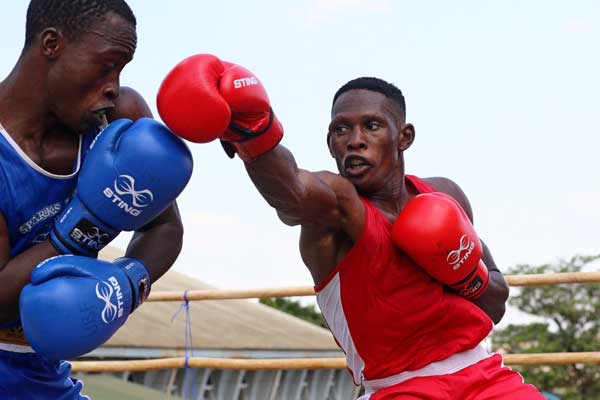Prime
Why have boxers shunned Muhangi’s contracts?

Some of the boxers after the press meet at East Coast club. ABDUL-NASSER SSEMUGABI
What you need to know:
- Akram Yiga, the manager of A&B Boxing Club, said he withdraw his 17 boxers from the Champions League because the contract is “meaningless.”
- On Monday morning, the aggrieved boxers converged at Legends Rugby Club but were denied access.
At 25, and having boxed for nearly 10 years now, Musa Shadir Bwogi is good enough to turn professional.
But as he prays and waits for such opportunities, the welterweight, who represented Uganda at the recent 2020 Olympics in Tokyo, might lose his rights to sign for any promotion if he signs the contract with the Uganda Boxing Federation (UBF).
Shadir, the national boxing captain, rallied some of his colleagues to reject the contracts, which they deem too “restrictive and exploitative.”
On Monday morning, the aggrieved boxers converged at Legends Rugby Club but were denied access. They moved to the nearby East Coast Boxing Club gym in Naguru where they told the press they cannot sign the contract on the current terms because “we only see exploitation, and no benefit.”
They demand changes. The meeting came a day before the signing deadline of November 16.
Some of the boxer’s obligations to UBF stipulated in the four-year contract, demand the boxer to surrender “his or her image, name usage and other rights to UBF or UBF assigned agents.”
But it does not explain how a boxer, like Shadir, who has singlehandedly made nearly 5000 Facebook friends, and 1,105 Twitter followers, will benefit from his image under UBF control.
“It doesn’t make sense,” featherweight Isaac Masembe substantiated, echoing everyone’s concern.
A boxer is also not allowed to engage in any boxing activity which is not sanctioned by UBF, without a written permission from UBF.
Meanwhile, the boxer must always keep in the best physical condition” to render the best services to UBF.
Boxers survive on menial jobs like working in abattoirs, gyms, markets, etc. and informal fights called “suicides.”
Still, UBF does not specify how it will compensate them for surrendering all these income sources.
Some called it “high level theft.”
And failure to sign means automatic withdrawal from the inaugural Uganda Boxing Champions League, in December, the default qualifier for the 2022 Commonwealth Birmingham Games.
The dilemma
This leaves the boxers in a dilemma: stand firm and forfeit a golden chance for probably a better future? Or succumb to the whims of a scheme that’s not clear on its promises?
Many, as usual, gave in and signed—some out of ignorance, because they are not familiar with reading, more so legal text, or coercion from their father-figure coaches.
One of them was vocal in the meeting, but told us he was in deep confusion because his coach was pestering him to sign.
The coach, who has always been labelled a rebel to Muhangi’s regime, told us on the phone that he chose to sign because “there’s no other way, unless we form our own federation.”
Probed on the benefits, if any, of the contracts, he said: “Clubs have been struggling to pay medical bills for injured boxers, now the federation will have to shoulder some of that burden.”
But the coach ignored the fact that most of the federation’s obligations to the boxers, are premised on “if resources permit,” not whenever need arises.
Akram Yiga, the manager of A&B Boxing Club, said he withdraw his 17 boxers from the Champions League because the contract is “meaningless.”
The contract also blocks boxers from talking to the public about federation issues, without UBF permission. But a senior boxer told us, on condition we don’t reveal his name, he signed the contract when he learnt that there’s a clause that allows him to opt out anytime. When we insisted on knowing that particular clause, he hung up.
“That 188 of 200 boxers have signed the contracts, it shows “a high level of democracy by the UBF administration,” UBF president Moses Muhangi wrote on a WhatsApp group.
But Yiga says those figures are inflated and the process of formulating the contracts was not democratic at all.
“We were shocked to be given the contracts in a meeting yet it was not on the agenda of the meeting,” Yiga said. “And Muhangi promised to call another meeting to discuss the contracts, which he didn’t and suddenly, he convened another meeting with only the boxers and gave him the contracts.”




